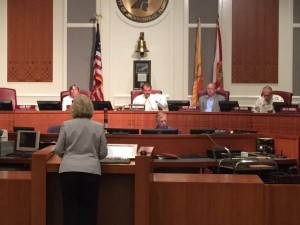Jacksonville, FL — The water management district brought out the big guns on Wednesday in an attempt to sell Jacksonville on the almost-finished Central Florida water supply plan, parts of which have been opposed in North Florida.

Top executives from three out of the five districts in the state came to the Jacksonville Waterways Commission meeting, a move that one city hall insider said was unprecedented.
Their message was clear: Central Florida will outgrow its water supply sometime in the next two decades, and will need to find alternative sources. The three districts – St. Johns River, South Florida, and Southwest Florida – all have been saying this for almost two years. What’s had people in this region concerned is that one proposed alternative is taking up to 150 million gallons a day from the St. Johns River.
“That sounds massive,” said Dr. Ann Shortelle, the new executive director of the St. Johns River Water Management District. “But flowing out the mouth here is 3.5 to 4.5 billion gallons a day, so that just puts it in perspective.”
She said river water withdrawal is just one of 150 potential projects in the plan, which is twice the number that will actually be needed.
“That’s a good thing,” she said, adding that there is no guarantee which projects will actually be built. The district wants the plan to “spur utilities and other water users into action, into planning….”
Shortelle also said there are several projects which will restore flow into the river and offset any withdrawals. There are 13 canals that cut across the St. Johns River watershed into the Indian River Lagoon watershed that are being restored. The district and the Army Corps of Engineers have spent $220 million to restore 56 million gallons a day with another 140 million in progress.
“We are dead-eye focused on improving the St. Johns River,” she said.
But some commission members questioned whether Central Florida is doing everything it can to avoid running out of water.
“By my calculations,” said Chair John Crescimbeni, reviewing the report, ”Central Florida uses 245 gallons of water per person versus Duval County where the use is 164.7 gallons per person.” Crescimbeni is also an at-large city council member.
Shortelle acknowledged Central Florida usage appears higher, but said it’s because there is more agriculture there and a larger tourist population, which increases the overall water usage.
Commissioner Steve Jenkins also questioned Shortelle about her comparison of Orange County’s and Duval County’s water reuse. She said Orange reuses 80% of its water whereas Duval only reuses 15%. “They (Central Florida) are also withdrawing a lot more,” he said after the meeting. “So it’s an unfair comparison.”
Dr. Quint White of Jacksonville University said he’s concerned some inputs to the model are outdated. The model shows consumption trending upward, whereas over the last five years, actual consumption has dropped. The district has acknowledged consumption is down due to homeowner efficiencies and utility incentives. At a workshop held earlier in the week at the University of North Florida, district staffers told the Board of Governors the model is recalculated every five years, so in 2020 the numbers would be updated.
St. Johns Riverkeeper Lisa Rinaman is also concerned about the “outdated” data and asked the district to postpone its November vote on the plan for a few months to address this and other issues. Rinaman wants conservation to be given more weight in the plan, and she wants the district to address issues raised in the peer review of the study by the National Resource Council.
The meeting was the first time Shortelle has had a chance to address North Florida since taking the helm at the district in May, after a controversial round of senior management resignations.
Shortelle said it’s only in the last decade that the interconnectedness of the underground water supply has been understood, which is why the three districts with conjoined counties are working together. So far, the plan has been 10 years in the making at a cost of around $25M.
The Duval Legislative Delegation, the Jacksonville City Council, and Mayor Curry have all publicly opposed river water withdrawals in recent months.
Final revisions are being made to the plan now for a November vote.

